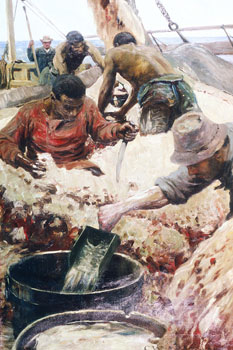A Motley Company
"A mixed and motley company" chased whales about the world’s oceans in the 19th century. Crew members included Native Americans, African Americans ,and a varied assortment of whites who shipped out of United States ports. Pacific and Atlantic islanders joined these sailors during the midyears of voyages, adding an international dimension to American whaling. Seamen who wrote about their adventures were typically literate, American-born whites. Historians have nevertheless gleaned information about the experience of whaling for men of different races and citizenship.
For men who had limited job prospects, whaling fortunes promised the means to purchase land and support a family. African American and Native American men, who had few economic opportunities on shore, signed on to whaling voyages in disproportionate numbers. They were more likely than white seamen to be older, make repeated trips, and leave families at home. Native American men, who had a long tradition of supporting their families by hunting and fishing, found whaling to be compatible with gender expectations within their communities. In the mid-1850s, a Mashpee commissioner explained,"Young men as a general thing go to sea."

Courtesy of the Trustees of the New Bedford Free Public Library